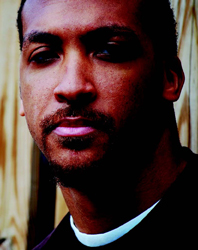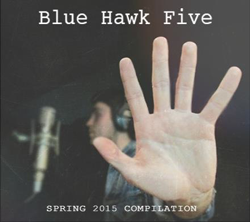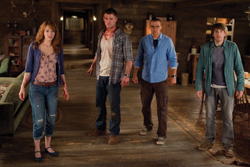Money Matters, written and directed by Ryan Richmond, kick started the second set of movies in the On Screen In Person series on February 6 in Pollak Theatre. On Screen In Person is a traveling film series along the East Coast where filmmakers present their work and participate in Q&A’s with audiences.
This series is sponsored by the Department of Communication and the Center for the Arts. It is also funded by National Endowment for the Arts’ Regional Touring Program.
Directors that have come to campus are: Nancy Kelly (Trust: Second Acts in Young Lives), Jim Hannon (Bethlehem), and Huey (In Good Time: The Piano Jazz of McPartland).
Chad Dell, Chair of the Department of Communication, welcomed a small crowd by saying, “I am really pleased you were able to come out tonight.” and introduced himself and Richmond. Richmond is an NYU Tisch School for the Arts graduate, and besides writing and directing, is “an accomplished cinematographer.” Dell said Richmond has worked on films like We The People, and his works have been screened in festivals like Sundance and Cannes.
Before the movie, Dell said Money Matters “started out as a short and [Richmond] expanded it.”
Money Matters is about teenager Monique Matters (Terri Abney), nicknamed “Money,” who is contemplating her life as she enters adolescence. She feels stuck and wishes to grow up, doing things like stuffing paper towels in her bra.
Her home life isn’t any easier, sharing a two-bedroom apartment with her single mother, Pamela (Aunjanue Ellis), who gives her daughter tough love and forces her to read the Bible when she misbehaves. Monique’s only outlet in life is writing poetry whether in her bedroom or during history class.
Meanwhile, Bobby Lewis (James Whalen), a priest with an unpleasant connection to Pamela’s life, is trying to escape his past by offering hospital patients prayers and hope.
When Monique meets Braids (Victoria Wallace), a member of the A-Street Angels, she has someone to relate to, and gets a strong lesson on life, love, and growing up as they spend more time together. Eventually, Monique, Pamela, Braids, and Bobby all cross paths and their lives are changed forever.
Richmond tells a tough story, but always keeps our attention intact by placing the camera close to actors and scenes to fully witness emotion and drama. When Monique is going to a club with Braids and she sees a boy she has a crush on, Richmond puts the camera close to Monique to capture her nerves.
Richmond also knows to relax and introduces intimate, quiet moments in the drama. He has a good sense of letting a scene’s momentum play out calmly and offering a sense of hope and happiness in a harsh world. When Monique reads her poems to Braids, there is a sense of peace in the film and sets up a connection between them.
Richmond’s script at first appears like three different stories are happening concurrently with Monique, Pamela, and Bobby, but as it continues, these pieces fall into place and the stories slowly converge. Richmond’s dialogue sounds like real teenager conversations. When a friend sleeps over Monique’s apartment, their discussion about oral sex isn’t forced but is natural in their discussion. We see these characters as actual teens rather than imagined versions.
In fact, Richmond said during the Q & A, “I hope the voices are realistic, but it’s through the research in the process,” such as focus groups and help from a friend.
Having been a cinematographer, Richmond films some nice shots of the D.C. area to feel like actually being on the neighborhood with Monique.
Lastly, with the acting, Abney and Wallace, create strong willed characters and do some tough scenes like when Monique and Braids kiss each other in the opening seconds. Ellis as Pamela presents a tough mother hoping her child doesn’t make the same mistakes she did. The cast works to make the audiences care about their individual futures.
After the film, Richmond thanked the audience and said, “I’ve been having fun screening [Money Matters] in schools and organizations.” He added the film was shot in 2008 and finally came out on November 15, 2011.
The Q&A was very active as people asked about Richmond’s film techniques, story decisions, and symbolism. Aaron Furgason, associate professor of communication, asked Richmond about his cinematic influences and Richmond listed Lenny Clarke (Kids), Spike Lee, and Thirteen by Catherine Hardwicke.
Andrew Demirjian, specialist professor of communication, asked about the sound in the film. Richmond said “I wanted it to have a different appeal” and worked with a guitarist to get the tone right.
Richmond continued to say the music was electric fusion but that it would change in the film such as go-go music at a party and urban music on the radio.
One student asked why the film was about a girl. Richmond said the film started as a short with a girl in a confessional, but “I hadn’t seen a lot of young black female protagonists,” noting certain films like Akeelah and the Bee. “Between these two influences, I wanted to tell a story that hadn’t been done before. If you notice, the film is about the relationship between a young mother and an adult child…Are they really parent and child or peers? I wanted to explore that dynamic.”
When it came to Money Matters’ demographic, a woman asked, “Who will be the initial target audience?” Richmond said women 25 to 45-years-old, “but we are trying to present it to youth. It was used in D.C. high schools. I feel like it has an educational element because of issues in the film.” He also added despite the language, “Schools have shown this as is.”
Dell mentioned how Ellis has been in films like The Help and Ray, and Richmond said for the younger actors “to work with someone they’ve seen on TV and in movies, it gave them a confidence boost.” Richmond also added, “I worked with the kids three months before we shot,” but once the camera started rolling and the lights went up, “it changes the game a little.”
Dell asked about Richmond’s future plans and he said, “I’m writing my next feature, a comedy…I will try to be a little more commercially viable and genre friendly.”
When The Outlook spoke to Richmond about how the film has been viewed while on tour, he said, “The reaction has been pretty consistent. [Crowds] enjoy it and relate to the characters, even the older crowd.” He said that even if the older crowd at screenings “didn’t get the language, they understood the struggle.”
Lee Callahan, a junior, and Paridhi Shah, a freshman, were in attendance and enjoyed the film. “It was not what I was expecting,” Callahan said. “I thought it was powerful.” Shah said, “I’ve never seen a movie like this told from a unique point of view.”
As for the On Screen In Person series, Callahan said it was “interesting” and Shah said, “I was glad we had the question and answer to clear up questions” about the film.
The next On Screen In Person film is Fambul Tok on March 5 in Pollak Theatre.
PHOTO COURTESY of onscreeninperson.wordpress.com




